Living without a fridge
I’ve been living without a fridge for the last three months – the winter months of Melbourne, Australia. Before you send me to the asylum, however, let me tell you about this experiment which produced several interesting, and I think important, surprises, related to energy consumption and lifestyle habits. My main conclusion, which I’ll unpack below, is that living without a fridge (at least in winter) is possible with minimal inconvenience.
Let me begin by noting that the fridge is the only household appliance (other than a clock) that is on 24 hrs a day, 365 days a year. It takes energy to cool things, and it takes more energy to freeze things. The typical fridge/freezer uses about 14% of household electricity (more if your fridge/freezer is large, old or inefficient). This is a very significant portion of household electricity consumption, so in an age when energy consumption is driving climatic instability, thinking about ways to reduce energy is critically important, even if at first some ideas seem a little crazy. Since energy costs money, reducing consumption also has obvious financial benefits. Those were my primary motivations for my experiment living without a fridge. I also felt that the fridge is probably the last appliance people (including me) would normally give up, so I was interested in the question of what life would be like without one. Now I know that life goes on more or less as usual.
But to make haste to my experiment. On the first day of winter my household switched the fridge off and, as I write, it is still off. You will see below that I set up a cool box out the window of the room off our kitchen, on the shady, south side of the house. I packed earth and sand around the cool box in order to store the cooler night temperatures, and the cool box helped keep out the warmer day temperatures. That’s my theory at least. I’m not claiming this is the best system for a non-electric fridge, but it worked perfectly well for me, and it was made using things I had lying around the house. (There is a different system that uses pot-in-pot that you might like to read about here and which I intend to experiment with one day.) I also put a polystyrene box over this fridge on warmer days, as extra insulation, but not sure whether that did much.
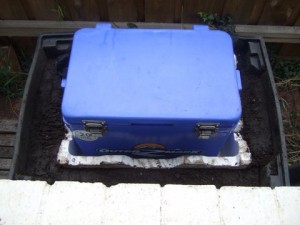
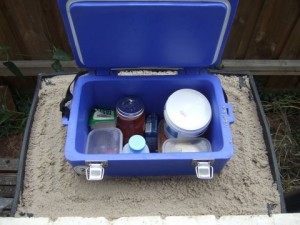
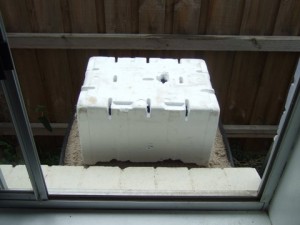 Since the cool box is small, we had to be very selective about what we kept in this new fridge. If you had a larger cool box, obviously more could be kept in it. The first lesson from this experiment was that about half of what we normally kept in the fridge doesn’t need to be in the fridge, things such as vegetables, butter, chilli sauces, jams, chutneys, curry pastes, etc. The things we did end up keeping the fridge included milk, yogurt, cheese, yeast (for bread making), and leftovers. Our grandparents knew this was possible, but in recent times the cultural tendency has been to refrigerate many things that don’t always need refrigeration.
Since the cool box is small, we had to be very selective about what we kept in this new fridge. If you had a larger cool box, obviously more could be kept in it. The first lesson from this experiment was that about half of what we normally kept in the fridge doesn’t need to be in the fridge, things such as vegetables, butter, chilli sauces, jams, chutneys, curry pastes, etc. The things we did end up keeping the fridge included milk, yogurt, cheese, yeast (for bread making), and leftovers. Our grandparents knew this was possible, but in recent times the cultural tendency has been to refrigerate many things that don’t always need refrigeration.
I’m a vegetarian so storing meat wasn’t an issue for me, and on the occasions when others in my household ate meat (about once a week), it was purchased on the day and eaten that night. Living without a fridge is possible, but you still have to take these types of precautions so as not to create health risks. As for milk, I purchased one litre of milk approximately every two days, and during the experiment we never had to throw out a single drop. I did have to go to the shops to buy milk more regularly, however, because usually we’d buy and store around four litres at a time, twice a week. But this minor lifestyle change turned out to be for the good, as it gave this rather computer-bound academic another reason to go for a short walk or a bike ride each day or two. What at first I thought would be an inconvenience, turned out to have this silver lining; indeed, it was more silver lining than cloud.
Another interesting consequence of this experiment was that food waste actually went down, not up, which surprised me. We throw very little food away anyway, but that ‘very little’ (which goes to the chickens or compost) essentially went down to ‘nothing’. Poor chickens. Given that we knew we couldn’t store food for very long, we carefully planned meals for the week (more than usual) and purchased accordingly, and this method (which is sensible anyway) minimised waste almost to nothing. Sourcing most of our vegetables from the back garden made this easier, but this is not a requirement for living without a fridge, as vegetables last surprisingly well out of the fridge.
As I enter my fourth month without a fridge, I sense that the time is coming when I turn the fridge back on. As spring weather warms up (its predicted to hit 25 degrees tomorrow), my outside, non-electric fridge will stop working as effectively. When food or milk starts to waste before consumption, that will defeat the purpose of the experiment, and the fridge will be turned back on. Next winter, however, I know the fridge can be switched off again. But don’t think this is a big deal. The last few months without a fridge have honestly passed without any hardship at all – making the fridge an unnecessary energy expense during cold periods. In temperatures typical of a Melbourne winter – which is all year round in many climates – a fridge is totally unnecessary.
This leads me to a final point. When I first thought of living without a fridge, I – like you, perhaps? – thought that it would be more or less impossible; a terrible hardship; a terrible inconvenience. But now, by experience, I can state that it is not. I find this is interesting. How many other things could we do without and cope just fine – things we currently consider necessities? How much energy and money could we save? How much superfluous consumption could we avoid? If something as ‘necessary’ as a fridge turned out to be unnecessary, then it suggests the scope of savings could be vast, benefiting both people and planet. Imagine if everyone turned off the fridge for three or four of the coldest months of the year: we’d reduce our electricity consumption by around 14% for that period, perhaps more. In an age of worrying climatic instability, this is a not insignificant reduction, and it doesn’t require any fancy new technology. It is essentially a ‘free’ saving. Of course, it would take a culture-shift of extraordinary proportions for this to happen, but my point has been that people seem to think it would be a much bigger deal than it actually is.
I believe that this message generally applies across the board: people in affluent societies could live very well while radically reducing consumption and radically changing their lifestyles toward much ‘simpler’ ways. This is very good news, because all the evidence suggests that true sustainability (as opposed to greenwash) implies cultures based on simple living and a post-growth macroeconomics of sufficiency (see here). Many think that this transition would be too hard, but this fridge experiment, modest though it is, suggests that even radical changes can be easily accommodated with a little creativity and an adventurous spirit.
As my old friend Henry Thoreau once said: ‘What old people say you cannot do, you try and find that you can. Old deeds for old people, and new deeds for new.’
__________
For my experiments with other alternative technologies, see my deindustrial washing machine, my solar oven, and my solar shower.


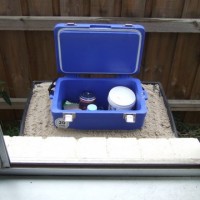
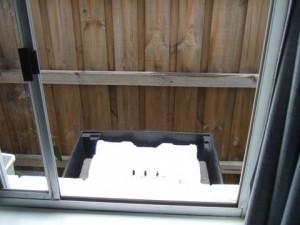


You can live without a fridge in summer too! We do for weeks at a time, and in some of Australia’s hottest zones.
We travel a lot and have a 20 litre cooler box, similar to the one in the pictures. When we first leave on our trips I have it packed with ice blocks and if I only open it once a day to take out the day’s supplies, they stay frozen for up to 8 days, depending of course on how hot it is. But even without the ice blocks butter stays firm. Travelling means we use longlife milk and it keeps for 24 hours in the cooler. I just buy the smaller cartons. It keeps veggies and fruit beautifully and as we don’t eat meat when we travel it’s not a problem for us.
Have to say though it has never occurred to me to not use the fridge at home!
Hi. We lived for four years with no fridge. What we used was an extension of the cool box idea you used. We had a concrete box, except that pumice was used instead of sand. We had the box on its side and with a door so that it opened much like a fridge door except that it was latched shut. Cooling was by keeping the outside of the fridge wet. Cooling was by evaporation. In Summer I froze plastic bottles of water and stood one next to our bottle of milk just to add to the cooling effect. The rest of our experience was just like yours. It really doesn’t take a great deal of effort to get into the routines required to manage without an electric fridge.
This is great Samuel. I’d be interested to know the temp inside your cool box? I believe an un-glazed terracotta pot with a lid would work even better, placed into the soil as you have here – yet keep the soil damp, also place a damp towel or hessian sack over the lid. The esky you have used would also be insulating OUT the cool of the soil.
What I admire most about you, Samuel, is your ability to give things a shot. Rather than reading and pondering about them you realise there is often little outlay and a potentially fruitful outcome, so you experiment. Kudos.
You said with regards to having to buy milk more often, “… this minor lifestyle change turned out to be for the good, as it gave this rather computer-bound academic another reason to go for a short walk or a bike ride each day or two”. Hear, hear.
We have developed a rather narrow view of reality. In particular, the ways in which problems (challenges, if you will) can be resolved. I am moving to the country. I don’t drive – never have, never intend to. I intend to rely on my trusty pushbike and public transport to do what I need to do. To most, this is madness. “How can you possibly do your grocery shopping by bike?” Easy, the same way I have been for the past 3 years. If that’s not possible for some reason, I will move to the next option – catch the once-a-day bus to the nearest town, or ask for a ride with someone that is heading into town. Further, my need to shop will be reduced due to having the land to grow more of my produce – shopping trips will be fewer and lighter.
It’s amazing what the human species is capable of when they put their mind to it. It’s equally amazing how disconnected we have become.
Latest post from Pavel – Desired World…How Many Plants Should You Plant?
Thanks for taking the time to try this and then to report on your experience. We’d like to learn more.
My wife and I are organic subsistence farmers in the southern US who produce a weekly podcast for others like us. Our listeners are always interested in ways they can become more resilient and less dependent on the industrial economy. Your experience living without a refrigerator is right on point.
We would love to interview you for 20 minutes or so by telephone about why you did this and what you’ve learned about it. Would you be willing?
Latest post from Lee Borden…Podcast #200 – Fall Vegetables
Great post. Personally the biggest social/environmental impact about not having a fridge are your eating habits.
In my Happy, simply home in NZ that is off all grids (and 10m2) I live without a fridge that makes my diet very local, very fresh and very active – don’t underestimate this as it makes a huge impact. Lentils, potatoes, hand full of fresh greens and drinking habits naturally fall into healthy and environmentally friendly!
Currently I am living in Uganda with a local family where they and most of their peers don’t have fridges – they can afford it but choose not as they eat food that is bought next door, cooked that day and eaten that day or the next… With a little bit of habit creation anyone can do it!
Lastly I do like a beer on a Friday evening to reflect on the week and socialise with friends (I know not environmentally pure but it is a small vice of two stubbies a week…). Fridge-less I became used to drinking not cold beer and again it is common here in Uganda (on the equator remember) where this is common…
Beat the mind game and live life to the fridge-less!
Latest post from d’Arcy Lunn…I think it would be easier to be gay than to be Happy, simply…
I live in Edmonton Alberta Canada, and lived without a frig for five months of the winter. I couldn’t store anything out side as it was far to cold in the range of -20 to -35 degrees C. I managed very well with in my home using a cooler and icepacks which were easily frozen outside. Could i manage in the summers here? I know that i could and would if i need too. I’m sure in the future that will be the case. I would use root cellaring, and other means . I’m glad of the learning experience . From the one extreme to another .
[…] not the only one who has experimented living without a fridge. Samuel Alexander turned off his fridge during the winter months in Australia, he came up with an […]
Aside from the root cellars, zeer pots, and cool boxes, there’s away to keep things by storing them in other things like sand. Notech magazine has at least one blog post in this.
Thanks for writing about this. I’d like to try this myself again. I’ve done it for 4 months in a Texas summer, but I ate at restaurants a little that summer.
Hi,
we have lived off-grid for over a year… the fridge we have is a simple solution, we use a small cupboard at floor level in the kitchen, we placed a stone slab in the bottom, then thick slate on the rest of the inside of the cupboard, this keeps the food below 4 Deg C even when it’s +20 outside.. nice and simple.
Samuel, my grand parents had a Coolgardie Cooler for many years living in hot dry WA wheat belt. They only got rid of it when ice delivery started in there district so they got an ice chest. Of course this was before refrigeration but they didn’t go without much, or at least, not much of what was important.
perhaps the Coolgardie Cooler hanging on the verandah may suit you this summer. It works better in hot weather.
Long distance sailors use very efficient insulated electric coolers frequently powered by small wind turbines or photo voltaic boards…why go in reverse to third world techniques when 21st century technology can be re-purposed??
Hi Paul, I used what I had lying around, and it worked well. That said, I’m interested in your comment. Any link that shows what you’re talking about? Cheers, Sam.
,I live off the grid with no fridge. The shack came with a gas fridge when I bought it, but the fridge sits on the porch and I have no intention of bringing it inside to connect to gas. It sits empty. I use a zeer pot. Pot in pot fridge under the kitchen bench and parked next to the disused cat flap for the breeze that comes in via the small opening. It works well even in Summer. Cheese and vegies will store well in an insulated (papers, foam, straw etc.) box on the lowest shelf of a pantry or bottom cupboard too btw for those who find the cost of clay pots outside their budget. An esky is a good insulated box and plenty in hard rubbish collections in fine condition.
[…] For other examples of alternative technology that I’ve written about, see my posts on solar ovens (here), my solar shower bag (here) my post-electric washing machine (here), and my non-electric fridge (here). […]
[…] Also check out a great blog from a great source of information and inspiration I draw upon – The Simplicity Collective and their blog on living fridge free: http://simplicitycollective.com/living-without-a-fridge […]
About 2 months ago my freezer went on the blitz and everything defrosted and of course I had to throw it out. I was amazed at the food I forgot about in the back of my freezer…what a waste. Then a few weeks later my fridge stopped working. I can afford to buy a new fridge, but wanted to wait for a good deal. In the mean time I bought a cooler, added a few bags of ice and lived that way for about a month. One month turned into two, and here I am on my third month. I can honestly say that living without a fridge has taught me few things. I only buy what I need and have practically no food waste. I learned that many of the foods we keep cold do not need refrigeration, condiments, butter, even eggs do well without having to be cooled.I will admit however that I like having ice, so buy a bag a few times a week.I have cut down on meat consumption and if I want meat I purchase it that day and usually in small quantities. Again I can afford a new fridge, but now it has become a challenge for me to see how long I can go without one. I live alone so any inconvenience is only to myself. So far I have not experienced so much in the way of being inconvenienced. I do know that I am not tempted to buy things like ice cream, large quantities of dairy products, but have them as a treat rather than always being able to reach for it any time I want. I will probably buy a fridge at some future date, but for now I am enjoying the novelty.